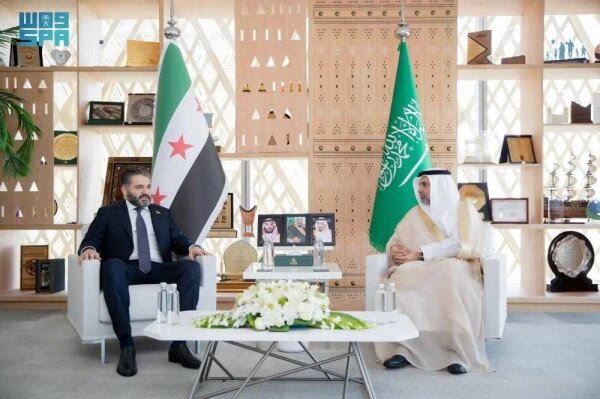Saudi and Syrian Ministers Collaborate to Enhance Health and Cultural Integration
Riyadh – Saudi and Syrian officials explore digital healthcare solutions and cultural cooperation to improve quality of life and advance regional collaboration.
In a remarkable display of regional cooperation and innovation, Saudi Minister of Health Fahad Al-Jalajel welcomed Syrian Minister of Culture Mohammed Yassin Saleh at the Ministry of Health headquarters in Riyadh on Thursday.
The meeting highlighted the commitment of both nations to strengthen collaboration in the fields of health and culture, leveraging digital technologies and shared expertise to benefit citizens and promote overall well-being.
During the discussions, the ministers explored ways to integrate healthcare and cultural initiatives, emphasizing the importance of collaboration in promoting a healthy lifestyle and raising awareness about public health
. This cooperation reflects a broader vision of combining cultural and health resources to improve societal quality of life, with both nations committed to sharing best practices, knowledge, and innovative approaches in their respective fields.
A highlight of the visit was Minister Saleh’s tour of the Seha Virtual Hospital’s command and control center, one of the world’s largest facilities dedicated to remote healthcare services powered by advanced digital technologies and artificial intelligence. The virtual hospital represents a transformative approach to healthcare delivery, enabling patients in Syria to access specialized medical consultations and expert advice without geographical constraints.
This initiative not only bridges distances but also strengthens regional ties, demonstrating the power of digital solutions in improving healthcare access.
The virtual hospital has successfully facilitated seamless connectivity between Saudi healthcare professionals and the Syrian Ministry of Health, allowing for continuous communication and knowledge exchange.
By connecting health cadres across borders, the initiative ensures that Syrian patients and medical teams benefit from cutting-edge expertise and advanced healthcare practices. The integration of AI-driven solutions enhances diagnostic accuracy, streamlines consultations, and accelerates treatment processes, showcasing Saudi Arabia’s leadership in healthcare innovation.
Minister Al-Jalajel emphasized that such collaborations are vital for advancing health services in the region while fostering a culture of care and wellness. “Our partnership with Syria reflects the shared commitment of both nations to improve public health outcomes and leverage technology to make quality healthcare more accessible,” he noted.
This approach aligns with Saudi Arabia’s broader Vision 2030 objectives, which prioritize digital transformation, innovation, and the application of advanced technologies to enhance societal welfare.
Minister Saleh expressed appreciation for the opportunity to witness the capabilities of the Seha Virtual Hospital and highlighted the benefits of exchanging knowledge and expertise. “The collaboration between our ministries demonstrates how cultural and healthcare initiatives can intersect to serve humanity,” he said.
By observing the advanced digital infrastructure, Syrian officials gained valuable insights into effective remote healthcare management and the integration of technology into health services.
The partnership between Saudi Arabia and Syria in this domain also serves as a model for regional cooperation, showing how nations can collaborate to overcome healthcare challenges, share technological innovations, and provide better services to citizens. The experience of connecting virtual healthcare platforms across borders illustrates the potential of digital solutions to address disparities in medical access while fostering international collaboration.
Beyond the immediate healthcare benefits, the collaboration fosters a culture of learning, exchange, and innovation. By promoting knowledge sharing, joint projects, and cross-border training, both countries are building a foundation for sustained progress in health services, cultural initiatives, and societal development.
Looking ahead, both ministries are expected to continue exploring opportunities for partnership, including joint programs, knowledge exchange, and expanded digital healthcare initiatives. These efforts are designed to enhance medical capabilities, improve patient care, and cultivate a robust health culture in Syria, all while strengthening the broader diplomatic and cultural ties between the two nations.
In conclusion, the meeting between Saudi Minister of Health Fahad Al-Jalajel and Syrian Minister of Culture Mohammed Yassin Saleh underscores a positive, forward-looking collaboration that combines healthcare innovation with cultural integration.
Through the Seha Virtual Hospital and ongoing cooperation, both nations are setting a benchmark for regional partnerships that prioritize quality of life, technological advancement, and shared expertise, reflecting a shared vision of progress and humanitarian service.



